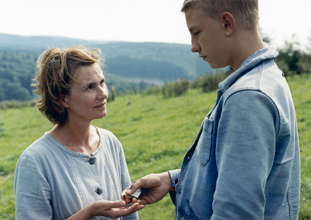A Wonderful Spell
Dominique Cabrera
Frankreich / Belgien / Kanada 2003

|
" Delphi 07.02. 19.15 |
Produktion: Les Films de la Croisade u.a.
Weltvertrieb: ARP Sélection, 13, rue Jean
Mermoz, 75008 Paris, Frankreich
Tel.: (33-1) 5643 6400, Fax: 4563 8337
E-mail: mh@arpselection.com
Buch: Antoine Montperrin, Dominique Cabrera
Kamera: Hélène Louvart
Schnitt: Sophie Brunet
Darsteller: Miou-Miou, Jean-Pierre Léaud,
Morgan Marinne, Marilyne Canto,
Julie-Marie Parmentier
Format: 35mm, 1:1.85, Farbe
Länge: 100 Minuten, 24 Bilder/Sek.
Sprache: Französisch
France, 1939. It is summer, an unforgettable summer for Alida, Fernand, Julie, Lucie, Colette and a few others who are enjoying the best bit about the calm: the freedom. Dominique Cabrera: ”When people first started fleeing (from the Germans during the Second World War, ed.), a group of patients led by an extremely paranoid man broke out of a psychiatric hospital. Some of them disappeared without trace, some returned to their families, while others fled to another hospital 300 kilometres away. I remember thinking right away that the story would make the perfect basis on which to discuss a utopian concept: social transformation, because it shows how these patients changed the moment their personal and social relationship to their environment changed. The story is only possible under very precise circumstances. At that time, all the familiar norms had suddenly disappeared. The normal social rules no longer applied. But as paradoxical as it sounds, when a society collapses, and with it hope, something new can still come out of it. The phoenix is reborn out of the ashes and is subsequently transformed. The film takes place at the end of an era, but for this group of fleeing patients it is a time of rebirth. All around there is life and death, but their life seems to have stagnated like in a dream or a fairytale. This is also the kind of notion that shaped the film."
Dominique Cabrera, geb. 1957 in Relizane/Algerien. Regisseurin, Drehbuchautorin und Schauspielerin. Filmstudium am IDHEC (Paris), Filme seit 1981, u.a. Demain et encore demain (Forum 1998), L’autre côté de la mer (1997), Nadia et les hippopotames (1999), Le lait de la tendresse humaine (2001).